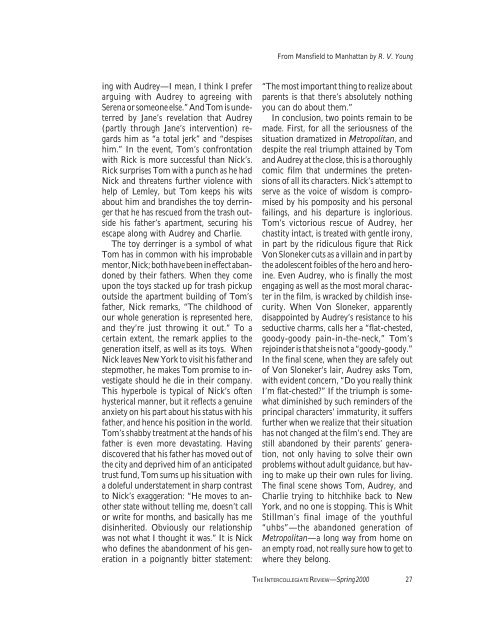From Mansfield to Manhattan: The Abandoned Generation of Whit ...
From Mansfield to Manhattan: The Abandoned Generation of Whit ...
From Mansfield to Manhattan: The Abandoned Generation of Whit ...
You also want an ePaper? Increase the reach of your titles
YUMPU automatically turns print PDFs into web optimized ePapers that Google loves.
ing with Audrey—I mean, I think I prefer<br />
arguing with Audrey <strong>to</strong> agreeing with<br />
Serena or someone else.” And Tom is undeterred<br />
by Jane’s revelation that Audrey<br />
(partly through Jane’s intervention) regards<br />
him as “a <strong>to</strong>tal jerk” and “despises<br />
him.” In the event, Tom’s confrontation<br />
with Rick is more successful than Nick’s.<br />
Rick surprises Tom with a punch as he had<br />
Nick and threatens further violence with<br />
help <strong>of</strong> Lemley, but Tom keeps his wits<br />
about him and brandishes the <strong>to</strong>y derringer<br />
that he has rescued from the trash outside<br />
his father’s apartment, securing his<br />
escape along with Audrey and Charlie.<br />
<strong>The</strong> <strong>to</strong>y derringer is a symbol <strong>of</strong> what<br />
Tom has in common with his improbable<br />
men<strong>to</strong>r, Nick; both have been in effect abandoned<br />
by their fathers. When they come<br />
upon the <strong>to</strong>ys stacked up for trash pickup<br />
outside the apartment building <strong>of</strong> Tom’s<br />
father, Nick remarks, “<strong>The</strong> childhood <strong>of</strong><br />
our whole generation is represented here,<br />
and they’re just throwing it out.” To a<br />
certain extent, the remark applies <strong>to</strong> the<br />
generation itself, as well as its <strong>to</strong>ys. When<br />
Nick leaves New York <strong>to</strong> visit his father and<br />
stepmother, he makes Tom promise <strong>to</strong> investigate<br />
should he die in their company.<br />
This hyperbole is typical <strong>of</strong> Nick’s <strong>of</strong>ten<br />
hysterical manner, but it reflects a genuine<br />
anxiety on his part about his status with his<br />
father, and hence his position in the world.<br />
Tom’s shabby treatment at the hands <strong>of</strong> his<br />
father is even more devastating. Having<br />
discovered that his father has moved out <strong>of</strong><br />
the city and deprived him <strong>of</strong> an anticipated<br />
trust fund, Tom sums up his situation with<br />
a doleful understatement in sharp contrast<br />
<strong>to</strong> Nick’s exaggeration: “He moves <strong>to</strong> another<br />
state without telling me, doesn’t call<br />
or write for months, and basically has me<br />
disinherited. Obviously our relationship<br />
was not what I thought it was.” It is Nick<br />
who defines the abandonment <strong>of</strong> his generation<br />
in a poignantly bitter statement:<br />
<strong>From</strong> <strong>Mansfield</strong> <strong>to</strong> <strong>Manhattan</strong> by R. V. Young<br />
“<strong>The</strong> most important thing <strong>to</strong> realize about<br />
parents is that there’s absolutely nothing<br />
you can do about them.”<br />
In conclusion, two points remain <strong>to</strong> be<br />
made. First, for all the seriousness <strong>of</strong> the<br />
situation dramatized in Metropolitan, and<br />
despite the real triumph attained by Tom<br />
and Audrey at the close, this is a thoroughly<br />
comic film that undermines the pretensions<br />
<strong>of</strong> all its characters. Nick’s attempt <strong>to</strong><br />
serve as the voice <strong>of</strong> wisdom is compromised<br />
by his pomposity and his personal<br />
failings, and his departure is inglorious.<br />
Tom’s vic<strong>to</strong>rious rescue <strong>of</strong> Audrey, her<br />
chastity intact, is treated with gentle irony,<br />
in part by the ridiculous figure that Rick<br />
Von Sloneker cuts as a villain and in part by<br />
the adolescent foibles <strong>of</strong> the hero and heroine.<br />
Even Audrey, who is finally the most<br />
engaging as well as the most moral character<br />
in the film, is wracked by childish insecurity.<br />
When Von Sloneker, apparently<br />
disappointed by Audrey’s resistance <strong>to</strong> his<br />
seductive charms, calls her a “flat-chested,<br />
goody-goody pain-in-the-neck,” Tom’s<br />
rejoinder is that she is not a “goody-goody.”<br />
In the final scene, when they are safely out<br />
<strong>of</strong> Von Sloneker’s lair, Audrey asks Tom,<br />
with evident concern, “Do you really think<br />
I’m flat-chested?” If the triumph is somewhat<br />
diminished by such reminders <strong>of</strong> the<br />
principal characters’ immaturity, it suffers<br />
further when we realize that their situation<br />
has not changed at the film’s end. <strong>The</strong>y are<br />
still abandoned by their parents’ generation,<br />
not only having <strong>to</strong> solve their own<br />
problems without adult guidance, but having<br />
<strong>to</strong> make up their own rules for living.<br />
<strong>The</strong> final scene shows Tom, Audrey, and<br />
Charlie trying <strong>to</strong> hitchhike back <strong>to</strong> New<br />
York, and no one is s<strong>to</strong>pping. This is <strong>Whit</strong><br />
Stillman’s final image <strong>of</strong> the youthful<br />
“uhbs”—the abandoned generation <strong>of</strong><br />
Metropolitan—a long way from home on<br />
an empty road, not really sure how <strong>to</strong> get <strong>to</strong><br />
where they belong.<br />
THE INTERCOLLEGIATE REVIEW—Spring 2000 27
















